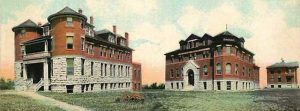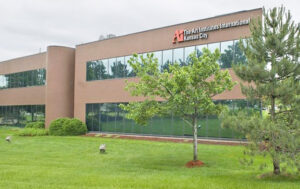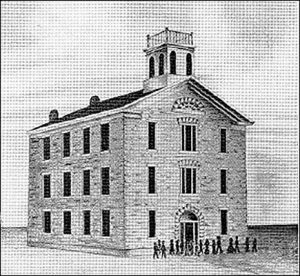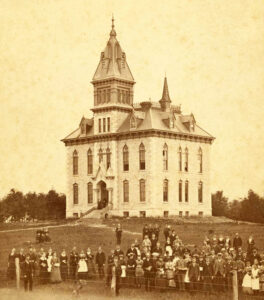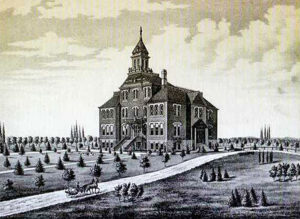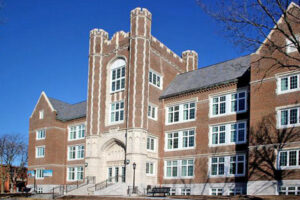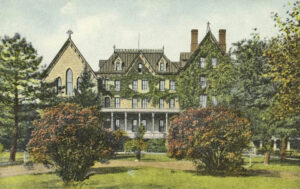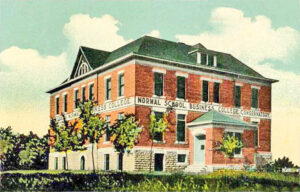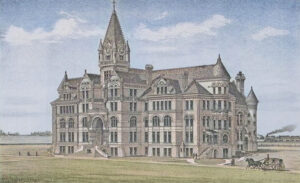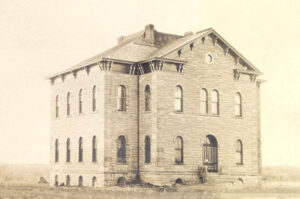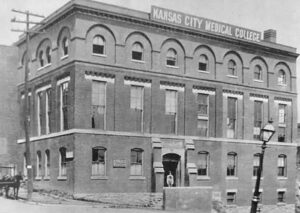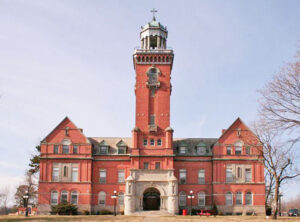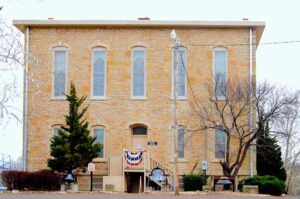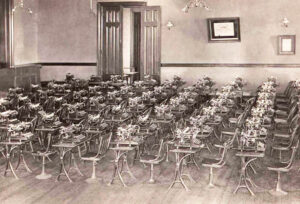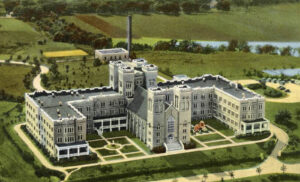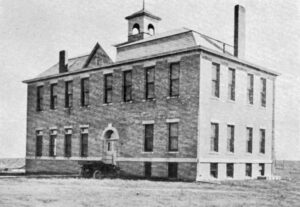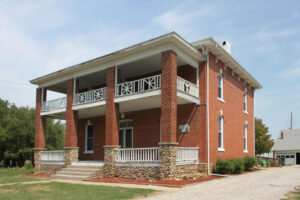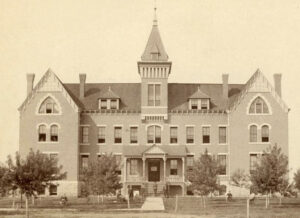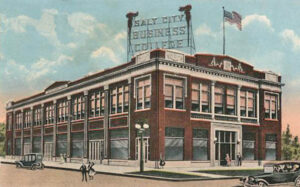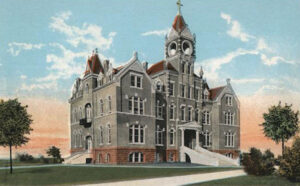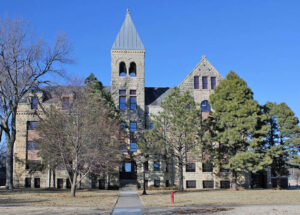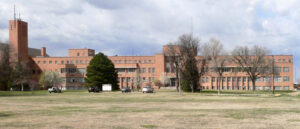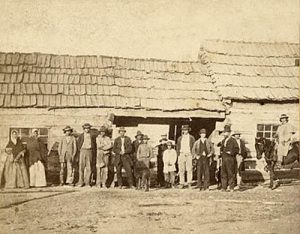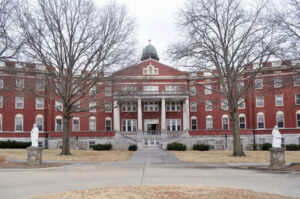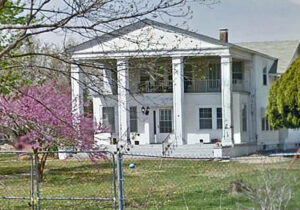| Name | Location | Type | Years | Information |
| Art Institutes International | Lenexa | Private | 2008-2019 |
The Art Institutes offered programs at the certificate, associate’s, bachelor’s, and master’s levels. By 2012, there were 50 campuses nationwide with roughly 80,000 enrolled students. The for-profit college chain was owned by a large company that faced allegations of illegal recruiting practices across 39 states and Washington, D.C., and numerous lawsuits alleging fraud. The company ultimately agreed to a historic $95 million settlement with the U.S. Department of Justice. Kansas had only one school within the system – The Art Institutes International-Kansas City. In 2011, it had an enrollment of 560. It opened in 2008 and closed in 2019. It was located at 8208 Melrose Drive in Lenexa, Kansas. |
| Atchison Business College | Atchison | Private | 1885-?? | The school fielded a college football team for at least two years in 1892 and 1902. |
| Atchinson College Institute | Atchison | Private | 1871-1885 | Mrs. Harriet E. Monroe founded the Atchison College Institute in Atchison, Kansas, in 1870 and erected a building at the northwest corner of Third and Kansas Avenue in 1871. Mrs. Monroe was a remarkable woman who was highly educated, a lady of refinement and culture, and spent much time on the lecture platform. During her 13 years at the Atchison College Institute, she supervised 2,621 students. |
| Baptist College | Pratt | Private | 1891-1893 | |
| Bethel Bible College | Topeka | Private | 1900-1901 | Sometimes referred to as the “Parham School of Tongues,” it was founded by evangelist Charles Fox Parham. |
| Bissing’s Conservatory of Music | Hays & Topeka |
Private | 1901-?? | Violinist Petrowitsch Bissing established this school. It began in Hays and relocated later to Topeka. It was still operating as of 1918. |
| Blue Mont Central College | Manhattan | Private | 1858-1863 |
Blue Mont Central College was a private Methodist institution of higher learning. It was incorporated in February 1858 and was the forerunner of Kansas State University. Kansas State University named Bluemont Hall to honor the college. |
| Bresee Theological College | Hutchinson | Private | 1905-1940 | It closed in 1940 to merge with Bethany-Peniel College. |
| Brown Mackie College | Salina | Private | 1892-2020 | The first Brown Mackie location was established in 1892 as Kansas Wesleyan College and later became the Kansas Wesleyan School of Business. It changed ownership in 1938 and became the Brown Mackie School of Business. Between the 1930s and 1990s, the school in Salina and other schools that would later carry the Brown Mackie name were managed by several different organizations before being purchased by American Education Centers in 1993. In 2003, Education Management Corporation acquired 18 schools, including the original Brown Mackie College, and rebranded them all under the Brown Mackie name the following year. Throughout the mid- to late 2000s, the university system expanded through the construction of new Brown Mackie colleges. Education Management Corporation reported owning 28 Brown Mackie College campuses and having enrolled 17,000 students in May 2013. In June 2016, Education Management Corporation announced plans to close all but four Brown Mackie campuses due to a significant decline in enrollment following lawsuits that cost the college system millions, damaged its reputation, and jeopardized its accreditation. Enrolled students were permitted to complete their degrees before the closing. The college building in Salina closed in 2020. Today, the building houses a NAPA Auto Parts Store. |
| Brown Mackie | Lenexa | Private | 1892-2020 | This location was a branch of the Salina campus, located at 9705 Lenexa Dr, Lenexa. The building is currently used by another corporation. (See Salina Brown Mackie above.) |
| Campbell College | Holton | Private | 1880-1913 |
Campbell College was the successor-in-interest to Lane University in Lecompton. It merged with Kansas City University, which also later closed. |
| Central Normal College | Great Bend | Independent | 1888-1902 |
This independent normal school opened in 1888, with D.E. Sanders as president and William Stryker as principal. The school then enrolled 400 students. In 1898, the Central Normal College company was organized and purchased the property, which initially cost about $40,000. The company engaged a competent faculty, reorganized the institution with Porter Young as president, and broadened the college’s scope. Under the new management, eight courses of study were introduced, including preparatory, common school teachers’, special science, scientific, classical, pedagogical, oratorical, and commercial. There was also a special course in shorthand and typewriting. |
| College of Emporia | Emporia | Private | 1882-1974 |
When this college was founded, it was associated with the Presbyterian Church and was one of two higher-education institutions in Emporia. The other was the “Kansas State Normal School,” established for teacher training and later became Emporia State University. The College of Emporia was a small liberal arts college on the west side of Emporia. By the early 1970s, enrollment had declined, and in the fall of 1973, the trustees were forced to close the college at the end of the semester. The Way purchased the campus for $694,000 in 1975, and this group operated the campus until 1989. Afterward, it was sold to a local investment group, and the buildings were repurposed, including Kenyon Hall, which was renovated for senior housing. |
| College of the Sisters of Bethany | Topeka | State then Private | 1861-1928 |
Chartered before Kansas became a state, this school was initially named the Episcopal Female Seminary of Topeka, but its name changed after it was re-chartered in 1870. The school operated under the Episcopal Diocese of Kansas until it closed in 1928. |
| Concordia Normal School | Concordia | State | 1874-1876 |
Concordia Normal School began on March 10, 1874, with Professor E. F. Robinson as its principal. Former State Superintendent H. D. McCarty was appointed president in the second year. The school opened for students on September 16 that year. There were 66 students enrolled in the first year, and in 1875, enrollment more than doubled to 171. Following the passage of the Miscellaneous Appropriations Bill of 1876, the state’s normal schools were consolidated into the Emporia Normal School, which later became Emporia State University. |
| Conway Springs Normal and Business College | Conway Springs | ?? | 1890-1894 | |
| Draughon’s Practical Business College | Fort Scott | Private | ?? | Draughon’s Practical Business College opened in Little Rock, Arkansas, in 1900. During its more than 90 years of operation, it offered a range of courses, from typing and shorthand to servicing television and radio equipment. |
| Emporia Business College | Emporia | ?? | ?? | |
| Enoch Marvin College | Oskaloosa | Private | 1878-1880 | The Methodist Episcopal Church South established it. In approximately 1904, the school was demolished, and a high school building was erected on the site. |
| Entre Nous College | McCracken | ?? | 1906-1912 | This school was founded by Howard Robert Barnard, nephew of Henry Barnard, the first U.S. Commissioner of Education, and Frederick Barnard, founder of Barnard College (now part of Columbia University). |
| Fort Scott Normal School | Fort Scott | ?? |
1878-1899 | It was also known as the Kansas Normal School. |
| Freedman’s University | Quindaro | ?? | 1867-1881 | In 1872, the Kansas legislature established the Colored Normal School as part of Freedman’s University. The university was later acquired by the African Methodist Episcopal Church and renamed Western University. |
| Garfield University | Wichita | Private | 1887-1890 |
In 1885, the Christian Churches of Kansas voted to establish an institution of higher learning, and in July 1886, work began on the building. It was named Garfield University in honor of the martyred President James A. Garfield, a Christian Church member and a friend of Dr. W.B. Hendryx, pastor of Wichita’s Central Christian Church. Garfield University opened its doors in September 1887. One class graduated in 1890. Then, two crop failures in Kansas forced the 380 Christian Churches of the State to close the school due to a lack of funds, and the unfinished structure stood empty. It was later acquired by James M. and Anna Davis, who donated it to Friends University. |
| G.A.R. Memorial National College | Oberlin | Private | 1890-1893 | Established by five women of the Women’s Relief Corps and endorsed by the Grand Army of the Republic posts of Kansas for the free education of soldiers’ and sailors’ children. It was said to have been the only such college of its kind in the United States. |
| Gould College | Harlan | Private | 1881-1888 | A United Brethren school, it was named for Jay Gould, who owned part of the Union Pacific Railroad. |
| Great Western Business and Normal College | Concordia | Private | 1889-?? | Founded by L.H. Hausam, it was sometimes referred to as Concordia Business College. This private school was different from the state-operated Concordia Normal School. The college eventually moved its operations to Webb City, Missouri. |
| Harper Normal and Business College | Harper | Private | 1914-1924 | Arkansas Christian College purchased the Churches of Christ assets, the predecessor to Harding College in Searcy, Arkansas. |
| Hobson Normal Institute | Parsons | ?? | 1882-1895 | |
| Iola Business College | Iola | ?? | 1899-?? | |
| Kansas Christian College | Lincoln | Private | 1885-1913 |
Established under the auspices of the Christian church in 1882, it began classes in 1885. It was incorporated in 1888 with a property valuation of about $15,000. The main building was two stories tall and contained classrooms and a laboratory. While the Christian church supervised the school, it was non-sectarian. Five courses of study were provided: classical, scientific, normal, commercial, and musical. During the first ten years, its growth was relatively slow, with only 84 students enrolled in 1893; thereafter, it expanded rapidly. |
| Kansas City Baptist Theological Seminary | Kansas City | Private | 1901-?? | This school later became a part of the Central Baptist Theological Seminary of Kansas City. |
| Kansas City College of Physicians and Surgeons | Kansas City | ?? | 1894-1905 |
Merged with what is now the University of Kansas to become K.U. Med Center. |
| Kansas City University | Kansas City | Private | 1896-1932 |
Kansas City University was a private Methodist university in Kansas City, Kansas, that was founded in 1896. Due to a lack of funds, it was closed in 1932 |
| Kansas Medical College | Topeka | ?? | 1890-1902 | It became a department of Washburn University. |
| Kansas Technical Institute | Salina | State | 1965-1991 | The Kansas Technical Institute was a two-year technical college located in Salina, Kansas, and was the predecessor of Kansas State Polytechnic. The school was created in 1965 by the Kansas Legislature and originally was named “Schilling Institute” because the campus was located on part of the former Schilling Air Force Base. It merged with Kansas State University to form Kansas State University – Salina College of Technology and Aviation. |
| Lane University | Lecompton | Private | 1865-1902 |
The first president, Reverend Solomon Weaver, founded the school, which was named after U.S. Senator James H. Lane, a Free-State leader. The school later merged with Campbell College, which also closed. Today, the building houses the Territorial Capital Museum, dedicated to Kansas history prior to the Civil War. It is listed on the National Register of Historic Places. |
| Lawrence Business College | Lawrence | ?? | 1869-?? |
Established by W.H. McCauley, this was the first business college in Kansas. The school was located on the third and fourth floors of the Lawrence National Bank building. The increasing enrollment each year forced it to relocate. Between 1900 and 1920, newspapers such as the Lawrence Daily Journal-World and the Topeka Daily Capital devoted an entire page to the benefits of attending the school. The college taught young men and women the tools to enter the business world successfully. It is unknown when or why the college closed. |
| Leavenworth Business College | Leavenworth | ?? | 1887-?? | |
| Leavenworth Normal School | Leavenworth | State | 1870-1876 | In response to a general appeal for the founding of additional Normal Schools, the legislature of 1870 provided for one at Leavenworth. The city furnished the buildings, and the school was organized with John Wherrell as president. In 1874, there were 100 students. In 1876, the normal schools of Kansas were consolidated into the Emporia Normal School, which later became Emporia State University. |
| Manhattan Business College | Manhattan | ?? | 1908-1924 | |
| Marymount College | Salina | Private | 1922-1989 |
A four-year liberal arts college opened in 1922 as a women’s college. The Sisters of St. Joseph of Concordia, Kansas, operated it. The original college was a three-story building that overlooked the Smoky Hill River. The single building on its 30-acre campus dominated the city’s eastern edge. The records were sent to St. Mary of the Plains College, which is also closed. |
| Midland College | Atchison | Private | 1887-1962 | In 1919, the College relocated to Fremont, Nebraska, to the former site of Fremont Normal School and Business College. In 1962, Midland merged with Luther Junior College, founded in Wahoo, Nebraska, in 1883. Midland College then became Midland Lutheran College. |
| Miltonvale Wesleyan College | Miltonvale | Private | 1909-1972 |
It ceased operation in 1972 when it merged with Bartlesville Wesleyan College in Oklahoma. It later became part of Oklahoma Wesleyan University. The school began operations in 1909 under Reverend Silas W. Bond and ceased operations in 1972, when it merged with Bartlesville Wesleyan College, which later became part of Oklahoma Wesleyan University. |
| Modern Normal College | Marysville | ?? | 1892-1904 | It was listed in a 1905 directory. |
| Moline College | Moline | ?? | ?? | |
| Morrill Normal College | Morrill | ?? | 1882-1888 | |
| Mount Carmel College | Scipio | Private | 1876-1884 | A Catholic college. |
| National American University | Overland Park | Private | 2018-2019 | National American University is a private, for-profit online university with an additional location at Ellsworth Air Force Base in South Dakota. In 2018, it acquired the assets of Henley-Putnam University and now offers strategic security programs. Most of the school’s academic programs use the 11-week quarter system and have monthly start dates. This college was initially called the “National School of Business” in 1941. It later changed its name to the National College of Business, then to the National College, before adopting its current name. It was located in Wycliff West Shopping Center at 0310 Mastin Street in Overland Park, Kansas. |
| National Business College | Coffeyville | ?? | ?? | |
| National Business College | Hiawatha | ?? | ?? | |
| National Business College | Kansas City | ?? | ?? | |
| Nemaha Commercial College | Seneca | ?? | 1900-?? | |
| Nickerson Normal School/Nickerson College | Nickerson | State | 1898-1918 | The Nickerson Normal College opened on August 30, 1898, with an enrollment of 78 students, which increased to 281 by the close of the year, June 9, 1899. It was taken over by Reno County High School in 1903, and its name was changed to Nickerson College. In 1911, Reno County High School became a member of the North Central Association of Colleges and Secondary Schools. C.L. Cole was the principal at that time. |
| Oswego College for Young Ladies | Oswego | Private | 1885-1920 |
Sometimes referred to as Oswego College, this school was operated by the Neosho Presbytery. Plagued by enrollment problems, the College closed in 1920 and sold its property to the Kansas Military Academy in 1922. The Italianate-style Edwards House, built in about 1874 as a private residence, and its surrounding property are the last remaining vestiges of the college. In 1885, the property was deeded to Oswego College for Young Ladies. The house was a part of the military academy’s campus for two years before an adjacent classroom and dormitory building suffered a devastating fire. The military school subsequently sold the property, and it reverted to a private residence. It was added to the Kansas State Register of Historic Places in February 2014. It is located at 910 Ohio Street, south of Highway 96 on College Street. |
| Ottawa Business College | Ottawa | ?? | ?? | |
| Ottumwa College | Ottumwa | Private | 1864-1872 | The Methodist Episcopal Church organized it and was later under the control of the Christian Church. It’s only the building that was burned to the ground on July 24, 1872. |
| Parsons Business College | Parsons | ?? | 1892-?? | |
| Pittsburg Business College | Pittsburg | ?? | 1894-?? | In 1908, the school had a football team, which lost one game to the local college team, Pittsburg State University. |
| President’s College School of Law | Wichita | ?? | 1994-2003 | Friends University acquired some resources. |
| Salina Normal University | Salina | ?? | 1884-1904 |
This independent, coeducational school offered collegiate, normal, business, science, and fine arts courses. The university’s first proprietor was Alexander Hopkins, who closed his East Illinois College in Danville, Illinois, and brought some students and faculty with him. The building was constructed on College Street, at the western end of Iron Avenue, for $40,000. It opened with a record-breaking initial enrollment of 60 at the Normal School. The building had 57 rooms, with the ground floor measuring 100 by 65 feet. It had two wings: a dormitory wing, able to house 60–75 students, and a college wing that could accommodate 500-600 students. The campus grounds occupied six acres. It was destroyed by fire in 1904 and was not rebuilt. At that time, it had 400 students. |
| Salt City Business College | Hutchinson | ?? | 1879-1979 |
The Salt City Business College moved several times and, at one point, was located at the southwest corner of Avenue A and Main Street. The school continued to grow, and in 1910 it relocated to a new building at the northeast corner of A and Walnut Streets. To reach the second-floor classes, students would enter from the south through a marble entrance. The school offered classes in accounting, bookkeeping, and business operations. The school also had a band and basketball teams. The school began to decline in the mid-1970s and closed down in 1979, its 100th year. The building still stands. |
| Skelton’s School of Telegraphy and Railway Business | Salina | ?? | 1887-1909 | It was an early adopter of teaching students both telegraph and typewriter skills. In 1909, it became a Union Pacific Railroad school and was turned over to Kansas Wesleyan Business College. |
| Soule College | Dodge City | Private | 1894-1903 |
This school was founded by Asa Titus Soule, a native of Rochester, New York, who made his fortune and reputation as the “Hop Bitters King” by peddling a patent medicine of Hop Bitters. Looking for a place to invest his newfound millions, he traveled west to Kansas. He initially invested in a scheme to build an irrigation ditch across western Kansas, but soon decided to invest in higher education. In 1886, Soule partially endowed a new Presbyterian college in Dodge City with $50,000, thereby founding Soule College. The college advertised on the board that tuition was $2 per week and $24 per year. After the school closed, the property was eventually purchased by St. Mary of the Plains College, which closed in 1992. |
| St. John’s College | Winfield | Private | 1893-1986 |
This was a two-year college operated by the Lutheran Church-Missouri Synod. The school began operations in 1893 under the English Evangelical Lutheran Synod of Missouri and Other States and ceased operations in 1986, after more than 9,000 students had completed its programs. Enrollment peaked in 1951 with 467 students. The church sought to consolidate the college with its other schools, but the college administration forestalled that option for several years. Finally, in spring 1986, the school announced that it would close at the end of the semester. It maintains an active alumni association. Baden Hall, the original building at Seventh Avenue and College Street, has been converted into apartments. It is listed on the National Register of Historic Places. |
| St. Mary of the Plains College | Dodge City | Private | 1913-1992 | St. Mary of the Plains College was a four-year liberal arts college in Dodge City, Kansas, that closed in 1992. It maintains an active alumni association. |
| St. Mary’s College | St. Marys | Private | 1848-1931 |
The Jesuits founded the original St. Mary’s College in 1848 as an Indian mission. The school is the site of the first cathedral west of the Missouri River and east of the Rocky Mountains. When the Potawatomi Indians left, the Jesuits turned it into a boarding school for boys, which closed during the Great Depression. After 1931, the 465-acre plot hosted the divinity school of St. Louis University. Following Vatican II, seminaries relocated to the city, and the land was sold; the Jesuit divinity school returned to St. Louis in 1967. A second College is currently located at the same site, also named St. Mary’s College. |
| Stockton Normal School | Stockton | ?? | 1887-1901 | |
| The Way College of Emporia | Emporia | 1975 | 1989 | It is in the exact location as the College of Emporia. It attempted a legal battle to gain the previous college’s endowment and lost. Enrollment dwindled to around 90 students. |
| Topeka Business and Normal College | Topeka | ?? | 1884 1890 | The Normal program may have been dropped after 1885. It was sold and renamed Strickler’s Topeka Business College. |
| Ursuline College | Paola | Private | 1896-1971 |
Ursuline Academy opened in 1896 as a parochial and boarding school. The Ursuline sisters’ convent was on the 36-acre campus from 1895 to 2008, when the 23 remaining sisters merged with the Ursuline Sisters of Mount St. Joseph in Maple Mount, Kentucky. The campus auditorium was given to the city of Paola and is now the Paola Community Center. The motherhouse is now home to Arista Recovery, a rehabilitation facility for people recovering from drug or alcohol addictions. The grounds along Wea Street feature the picturesque motherhouse, cemetery, and the Paola Community Center, which was previously part of Ursuline Academy. |
| Utopia College | Eureka | Private | 1946-1970 |
This was a two-year college that granted certificates but not diplomas. It was established in 1946 by Roger Babson to bring practical business instruction to other parts of the United States. Graduates were invited to complete their baccalaureate degrees at Babson College. The name was changed in 1955 to Midwest Institute of Business Administration. Due to declining enrollment, the school closed permanently in 1970. The building still stands at the corner of East 5th Street and North St. Nicholas Street in Eureka, Kansas. |
| Walden College | McPherson | Private | 1905-1914 | The first classes of the Swedish Evangelical Mission Covenant were held in the McPherson Opera House. Science Hall was completed in 1906. The buildings were sold to Orleans Seminary, which became Central Academy and College. |
| Western Business College and Normal School | Hutchinson | ?? | 1885-1889 | It was initially known as Arkansas Valley Business College. It is believed to have merged with Hutchinson Normal College. |
| Western Musical Conservatory | Emporia | ?? | 1871-?? | Listing found |
| Western Theological Seminary | Atchison | Private | 1893-?? | This Evangelical Lutheran College was listed as operational as of 1902. |
| Western University | Quindaro | Private | 1864-1943 | The earliest historically black college or university west of the Mississippi River. The buildings are gone today. |
| Wichita Business College | Wichita | ?? | 1901-?? | Wichita Business College was a vocational school governed by the Kansas State Department of Education. The school had a football team in 1901 and 1902. The school offered a curriculum consisting of computer programming, accounting, bookkeeping, court reporting, drafting, career secretarial, and receptionist programs. In the 1980s, an action was brought under the Kansas Consumer Protection Act and the federal Truth in Lending Act for Wichita Business College’s deceptive practices. In June 1985, the jury found the college had committed four separate violations of the Kansas Consumer Protection Act and found actual damages of $2,000. |
| Wichita Commercial College | Wichita | ?? | 1893-?? | In October 1920, its name was changed to American Business College. |
| Wichita University | Wichita | Private | 1886-1893 | In 1892, it was a German Reformed Church with a faculty of 15. The Sisters of St. Joseph later used the building as a convent and orphanage until it burned in 1913. |
| Windsor Commercial College | Fort Scott | ?? | 1897-?? | |
| Winfield Business College and Normal Institute | Winfield | ?? | 1895-?? | Although the college operated, there is no evidence that the institute had any graduates. |
| Wright Career College | Overland Park | ?? | 1921-2016 | Founded as Dickinson’s Business School. In 2016, 1,000 students and 200 staff members at five campus locations were affected when the school abruptly closed its doors. All students were notified by email on Thursday evening that the school would be closed the next day. |
©Kathy Alexander/Legends of Kansas, updated January 2026.
Also See:
One-Room, Country, & Historic Schools of Kansas
Sources:
Blackmar, Frank W.; Kansas: A Cyclopedia of State History, Vol I; Standard Publishing Company, Chicago, IL 1912.
Connelley, William E.; A Standard History of Kansas and Kansans, Lewis, Chicago, 1918.
Digital Doulas County
Friends University
Phony Diploma
Wikipedia

